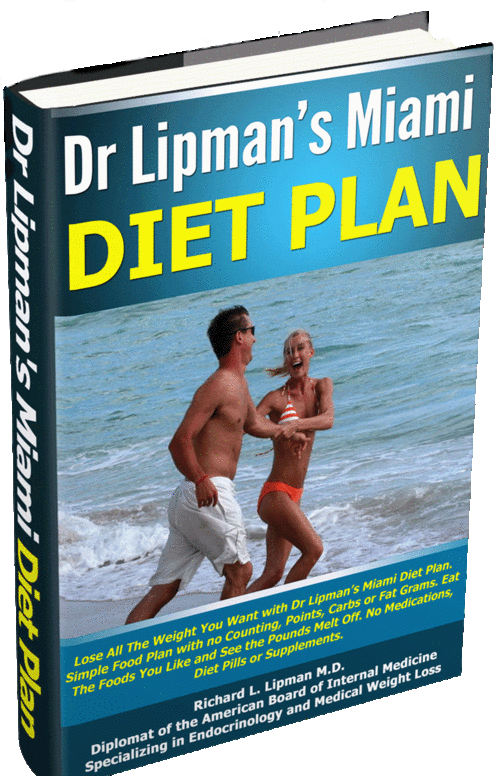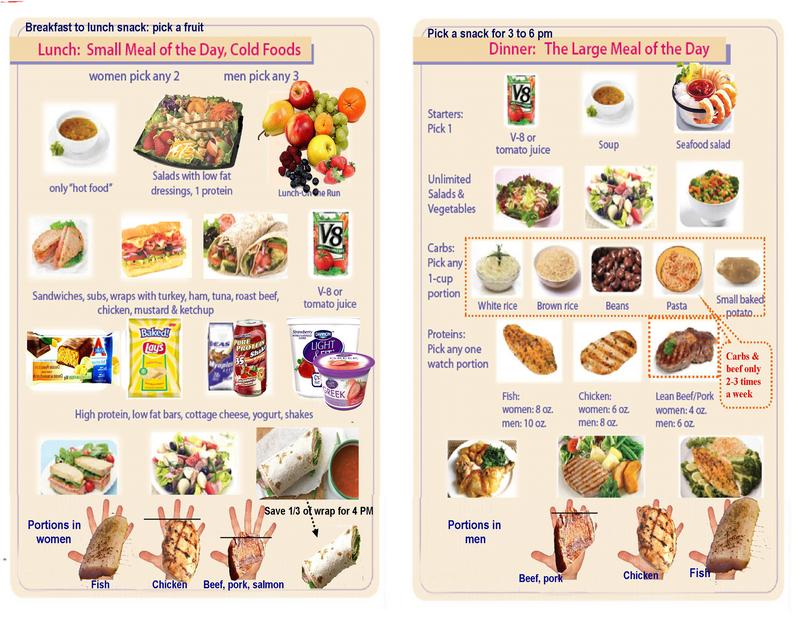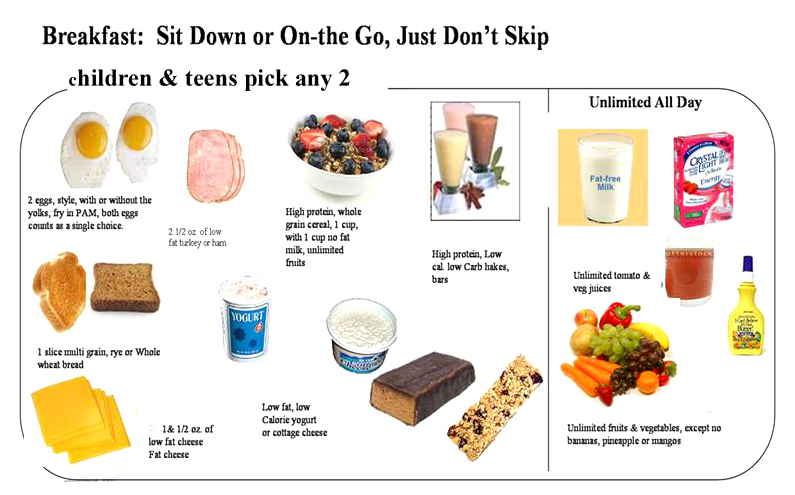The 100 Calorie Secret is Turning The Diet Industry Upside Down. A Weight Loss Doctor Finally Reveals the Secret of How to Lose Weight Without Dieting Ever Again Lose 10, 20, 30 and More Pounds Right Now!
Watch Dr. Lipman on CBS-TV
Diplomat of American Board of Internal Medicine
Endocrinology & Metabolic Disorders
Dr Lipman's Miami Diet Plan: Breakfast, Lunch, Dinner
305-670 3259
Dr Lipman's Miami Diet Plan: What's To Eat
The meals in the Miami Diet Plan are a drastic departure from all other
published food or diet plans. The difference is not just in the medication regimen.
Almost all of the diets I have seen over the past 20 years advocate categorizing
foods and counting points, calories, carbs, fat, or protein in an attempt to lower
total food intake. I have treated countless patients who have attempted to lose
weight by drinking special shakes or eating diet bars, by buying prepared foods
and meal programs, by rotating foods from an “approved” list or by eating at
certain hours and not eating at other hours. Others diets require exotic, expensive
, or unusual foods not easily found during the normal course of the day. Why do these
diets fail? Most often, they either fail to focus on the problems of hunger and cravings
, or they are impossible to remember—too complex, too expensive, and require too much shopping and cooking. Additionally, a diet implies starting and stopping something. Few people start these diet programs with the intention or comprehension that, to remain successful, it will have to be a lifelong program—yet successful weight maintenance is a lifelong commitment and does not end when the diet ends.
This food plan is not a diet in the traditional sense, but a change in eating habits that can be practiced for life because it requires only a few simple adjustments. In the plan, you first identify and then eliminate the personal food triggers that have caused most of your weight gain. You will adopt the same techniques employed by thousands of individuals who have lost and maintained substantial amounts of weight over a long period without even realizing it. These are simple changes and that is why they can work for you. With the aid of prescription strength appetite suppressor, your hunger and cravings are significantly reduced, which gives you a chance to learn how to make better food choices.
Finding a Weight Loss Program Based on What Works
The weight loss plan you will use is not based on any preconceived notions as to what you should and should not eat. Rather, it based on the strategies used by individuals who have successfully lost weight and kept that weight off for years and years. I have reviewed the strategies of hundreds of patients I have followed for years in my weight loss practice who have lost weight and never regained the weigh. Among the strategies used by almost all successful weight loss maintainers:
- They eliminated a few target foods such as sugary drinks, fast foods and bad snacks.
- They rarely skipped breakfast.
- Almost all ate a small lunch.
- All of them prevented hunger and cravings later in the day with multiple snacks.
What they did not do was eat special foods, count calories, carbs, fat grams, or anything else.
Food Triggers Causing Your Weight GAIN
In the next paragraphs I'll take you through the process of determining the two or three trigger foods that have caused most of your weight gain. Once you know why you’ve gained the weight and have found a simple system to chose better foods, then you will build a daily food plan based on your personal needs and, most importantly, based on what you like to eat (not burgers and fries). This commonsense food plan, with or without the help of medications, will help you to develop a new eating routine that will afford you the opportunity to lose and maintain your ideal weight for life.
The Miami Food Plan is based on maximizing the effects of the drug combination by reducing foods and drinks that cause hunger (carbs) and increasing those that produce fullness (proteins, fruits, vegetables and low Glycemic Index carbs).
Five simple food categories are the cause of the most weight gain in almost all overweight people. They need to be reduced as much as possible. The most important triggers are those on the top of the list:
Trigger Foods to Eliminate
- Drinks with Sugar: regular soda, fruit juices, sports drinks (like Gatorade)
- Fast foods: hamburgers, French Fries, onion rings, fried fish, chicken nuggets
- Large lunches: pizza, chicken, beef, potatoes, fries, pasta, rice
- Snacks in large, multi portion containers
- Bagels, sugary cereals, pastries, donuts
Ingredients to Eliminate:
- Sugar, dextrose, sucrose, honey, molasses, corn syrup, high fructose corn syrup
- No tropical fruits such as bananas, pineapple, and mangoes. No dried fruits.
Be Watchful for the First Two Weeks:
- Rice, pasta and potatoes (only at dinner) no more than three days a week.
- Two slices of bread a day (only rye, reduced carb, whole grain or whole wheat).
Eat your vegetables: you can eat any and all vegetables any time of day All fruits are great choices, except tropical fruits such as listed above, and dried fruits
Breakfast on the Miami Food Plan
Secrets to a Good Breakfast
1. Drinking only juice is the same as skipping breakfast.
2. Skipping breakfast will lead to poor choices at lunch and loss of control over foods for the rest of the day.
3. Convenience rules at breakfast—it’s easy to avoid bagels, pastries, donuts, muffins, sugary cereals, and pop tarts if alternatives are easily available.
4. Choose foods high in protein and low in carbs with easy portion control.
What to Avoid at Breakfast
1. Sugary cereals
2. Don’t skip breakfast!
Lunch on the Miami Food Plan
Most people naturally assume weight gain is due to snacking and poor food choices or portion sizes at dinner. Although this may be partly true, the mistakes made at lunch can far outweigh a few bad snacks or a large meal at dinner. Hard to believe?
Read on. A sandwich, sub, salad, or soup each average about 400 calories. Fast foods, fried foods, and hot dishes containing meat, chicken, rice, potatoes, or pasta (a large meal), typically average between 1,000 and 1,600 calories. The difference between the two types of meals can be as much as 1,200 calories per day.
Secrets to a Good Midday Meal:
Keep it Small and Light (and Eat Foods Served Cold):
- Few people that work inside a building all day can eat two large meals in a single day without gaining weight.
- The time of day when a meal is consumed has no implication on weight gain or loss, so save the big meal for the evening. A large evening meal is with family.
- Foods served cold are low in calories and have easy portion control.
- Eating a small lunch guarantees that there will be only one large meal eaten per day.
- Sandwiches and wraps make great choices. They have easy portion control, and high- calorie side dishes are seldom eaten with sandwiches or wraps. Don’t eat subs for the first two weeks. After two weeks, limit them to 2-3 times a week per week because of the high bread content.
Avoid skipping lunch, eating fast food, fried food, meat, hot chicken, fish, pasta, rice, potatoes, pizza, or leftovers from the previous night’s dinner.
Secrets to a Good Dinner: The Large Meal on the Miami Food Plan
Dinner is the large meal of the day. The family sits down together and has this meal together. It’s an important time to talk about the day’s events and future plans. Even 15-20 minutes set aside for this meal is better than nothing. The TV and homework are put aside. The protein and carb part of the dinner is where portion control counts. The biggest challenge to any meal of the day is fast food, because of its high calorie content. In addition, foods with difficult portion control, such as proteins & carbohydrates, require special attention; the more caloric a food, the more critical its portion size. Below are suggestions for the dinner meal. Remember, portions are most important when eating beef, pork, and carbs.
1. Dinner should be the big meal of the day; it’s time to relax and eat with family.
2. Many items are completely or almost unlimited, including soups, salads, and vegetables served without butter or with low-fat or fat-free salad dressings.
3. Choose baked, barbecued, or grilled entrees, not breaded dishes, NO FRIED or FAST FOODS.
4. Be careful with proteins and carbs that have portions that are difficult to control.






